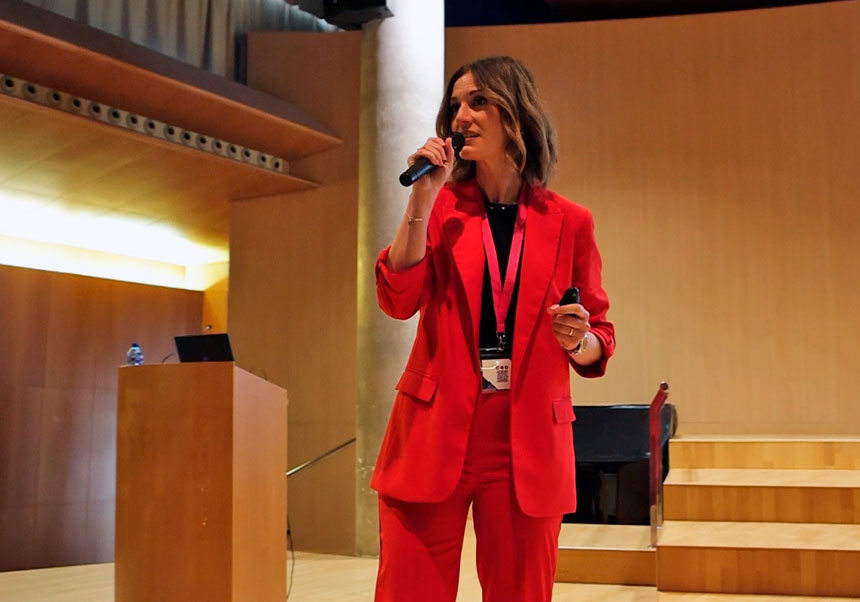Interview with Pilar Domingo-Calap: Phagotherapy to stem the silent pandemic of multi-resistant bacteria
- Web and Marketing Unit
- Cristina Soriano Cabellos
- March 14th, 2024
During the Second Congress of Virology held at the Burjassot Campus of the UV, the prestigious researcher Pilar Domingo-Calap highlighted the rising menace of multi-resistant bacteria. Besides, she introduced the developments reached through innovative therapies based on phages, offering an encouraging view for the future of medicine.
Q- Could you explain what multi-resistant bacteria are and why they represent a significant challenge for public health and modern medicine?
A- These are bacteria that have now acquired the ability to live in presence of antibiotics. So, if we used to be able to treat a bacterial infection with amoxicillin, now we cannot, because the bacteria have become multi-resistant. It is a global problem that causes more than a million deaths a year. To give us an idea, here in Spain, traffic accidents cause around 1,000 deaths a year, and with the problem of multi-resistant bacteria, there are between 10,000 and 15,000 deaths a year in our country, so we are facing a real problem that requires short-term solutions.
Q- As Director of the Environmental and Biomedical Virology group at I2SysBio, could you briefly explain the latest research projects in which the group is involved?
A- Given this situation, which is already known as the silent pandemic, what our research group is trying to do is to develop and implement new control strategies based on bacterial viruses, on phages. It is known that viruses in general are bad, they cause infections, but what we are doing is using this ability to kill cells to use them as biocontrol, biotechnological or biomedical tools.
Our idea is to go to the environment, because these viruses, these phages, are the most abundant biological entities on the planet, so we are going to look for them in the environment to kill a target bacterium in a very effective and very precise and personalised way. We do this from a One Health global health approach, where we are going to fight bacteria that cause infections in humans, in animals, in plants and even in the ecosystem. Our idea is to develop and implement these very novel strategies to treat patients who have no solution, but also as diagnostic and preventive tools.

Q- You are co-founder and scientific director of Evolving Therapeutics, a spin-off of the Universitat de València that develops biotechnological solutions for the prevention, diagnosis and treatment of resistant pathogenic bacteria, with a phage-based methodology. Could you explain to us what phagotherapy is and how it could revolutionise the treatment of antibiotic-resistant bacterial infections, especially in the context of national health?
A- Phagotherapy consists of the use of these phages, these environmental viruses, to kill bacteria that are currently untreatable in a very precise way, without side effects. Phagotherapy in Europe is not yet regulated, but in Spain it is possible to use them as a compassionate treatment, that is, as a treatment of last resort in patients who have a chronic infection caused by a bacterium that has no treatment.
Therefore, in our research group and, through our spin-off Evolving Therapeutics, what we are doing is producing therapeutic phages with which we will ultimately be able to save lives and help patients improve their quality of life.
We also do this in veterinary medicine and in crop fields. The company has also been a pioneer in using phages as a biocontrol treatment on vines, in a vineyard in the Balearic Islands against the Xylella fastidiosa bacterium, which is also a very problematic pathogen today.
Q- Could you share with us some advances in the development of phage-based antiviral therapies?
A- We have already carried out 6 treatments here in Spain as a compassionate treatment, some of them with very promising results. We are talking about people who, in our case, have cystic fibrosis almost always, which is a genetic disease that causes them to have —broadly speaking— lung problems associated with mucus that causes bacteria to acquire, grow and colonise them, in many cases multi-resistant bacteria, without treatment. We carry out simple treatments with nebulised phages so that they reach the lungs in about 10 days and we have seen that patients are able, in a few days after treatment, to recover their quality of life, improve expectoration, lose mucus and also improve their lung capacity. Thus, we are improving their lives thanks to phagotherapy.
Q- As a professor on the Master's Degree in Virology at the Universitat de València, and in particular as coordinator of the subject Scientific Conferences, could you share your opinion on the relevance of this congress for the training of students on the Master's Degree?
A- The interesting thing here is that in Valencia we are a very strong virology hub, we have had the Master's Degree in Virology for two years and this particular subject "Scientific Conferences and Seminars" has two blocks: In the first block we bring an expert guest and the students have to generate a small presentation based on what the speaker will be able to talk about. And the second part is the creation of the Congress, they have to organise the Congress from the inside, have its President, Vice-President, a scientific commission... and, therefore, I think it is a very important part that gives the students another type of improvement.
File in:
















